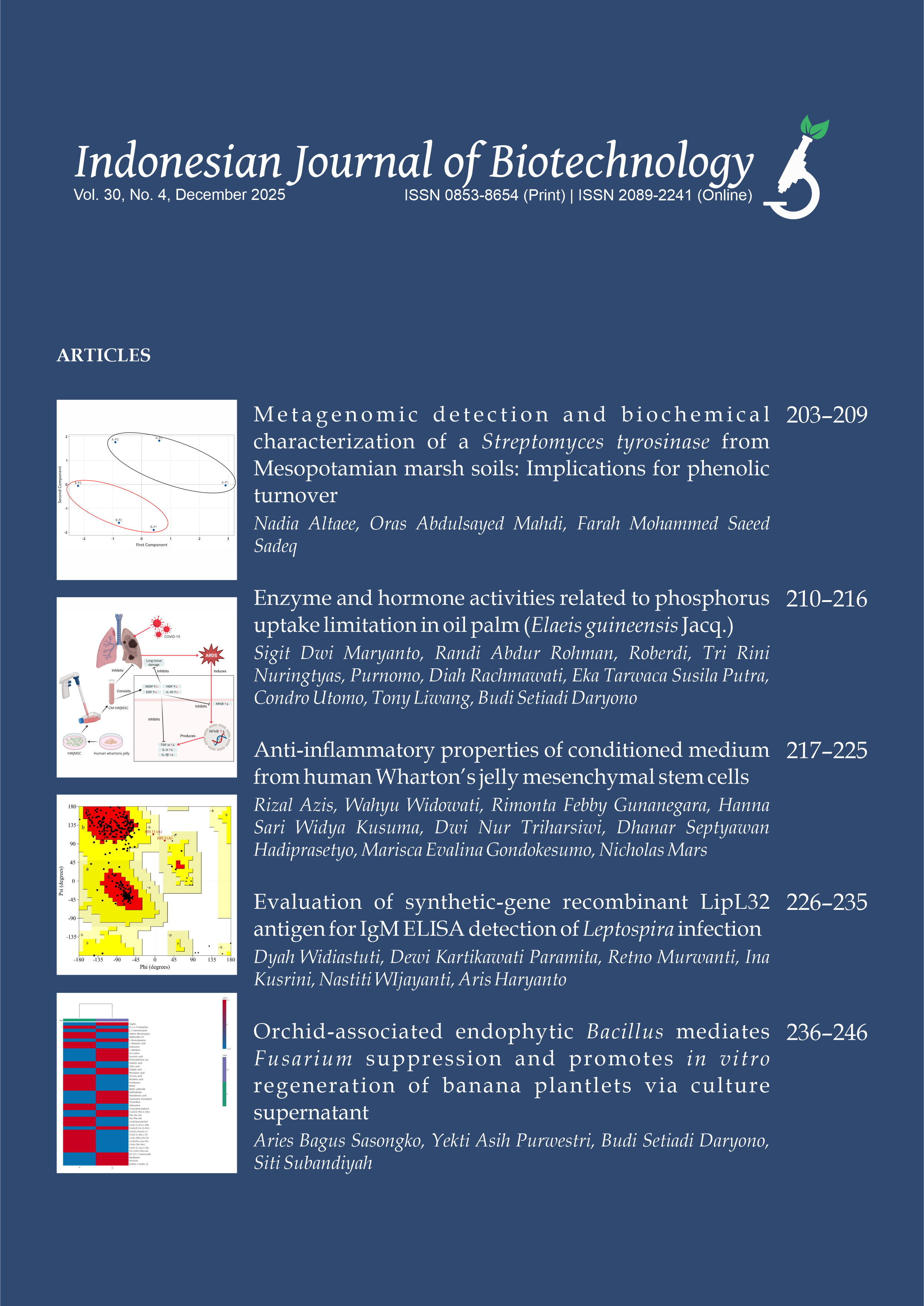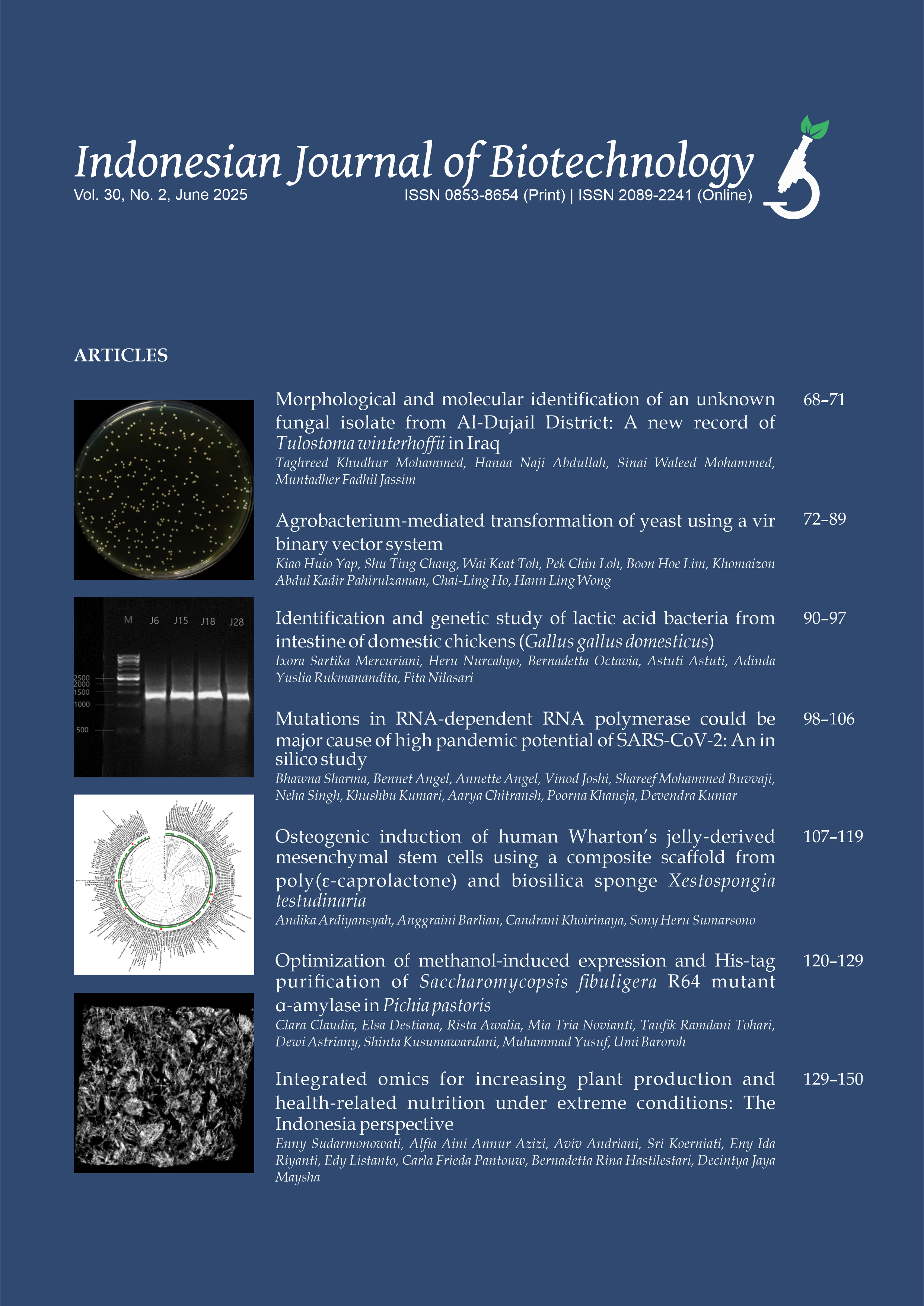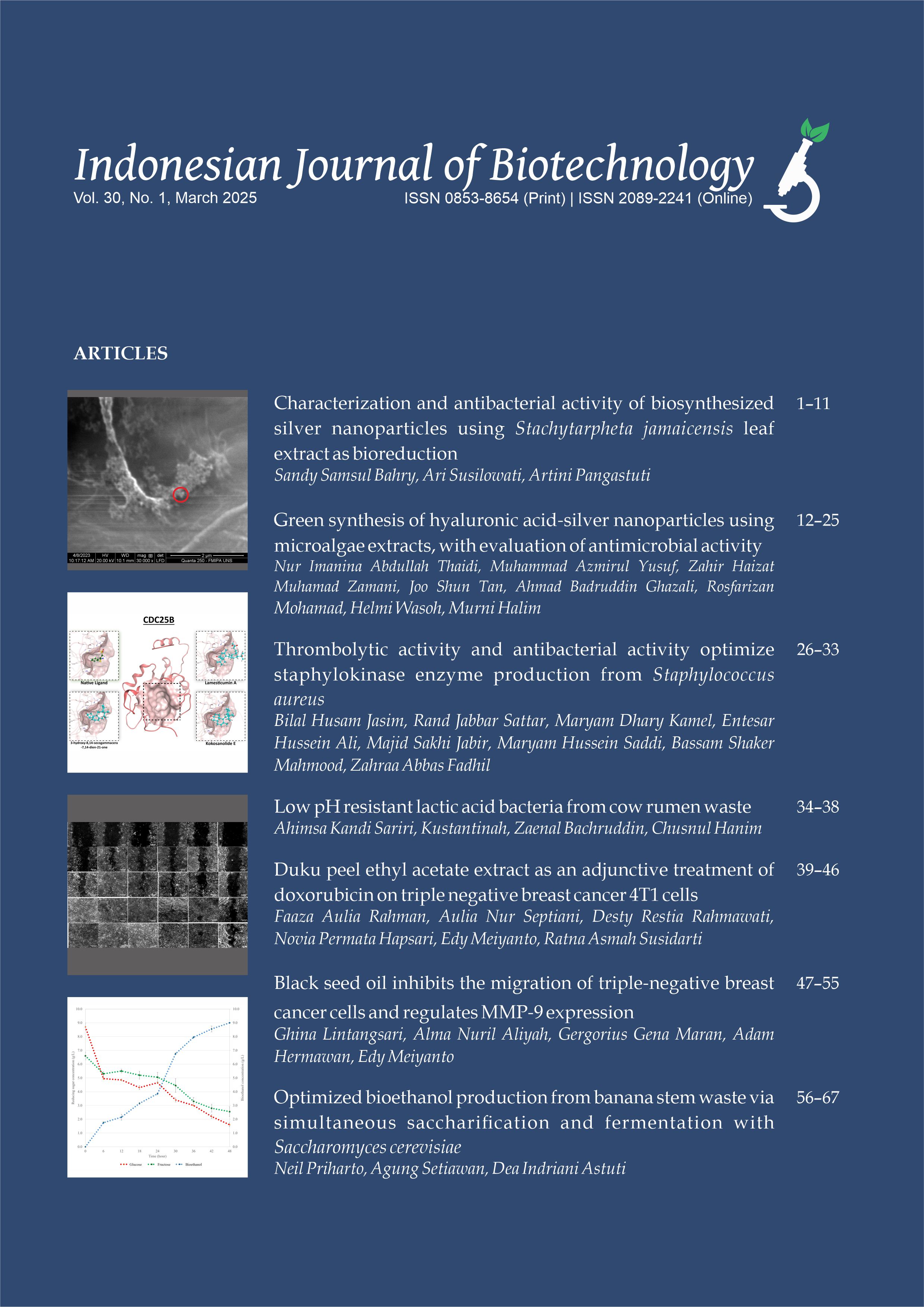Identification of BSA B1 Bacteria and Its Potency of Purified Cellulase to Hydrolyze Chlorella zofingiensis
Rifqi Zahroh Janatunaim(1), Radhiyah Mardhiyah Hamid(2), Ghea Putri Christy(3), Yekti Asih Purwestri(4), Woro Anindito Sri Tunjung(5*)
(1) Laboratory of Biochemistry , Faculty of Biology, Universitas Gadjah Mada, Jl. Teknika Selatan, Sekip Utara, Yogyakarta 55281, Indonesia.
(2) Laboratory of Biochemistry , Faculty of Biology, Universitas Gadjah Mada, Jl. Teknika Selatan, Sekip Utara, Yogyakarta 55281, Indonesia.
(3) Laboratory of Biochemistry , Faculty of Biology, Universitas Gadjah Mada, Jl. Teknika Selatan, Sekip Utara, Yogyakarta 55281, Indonesia.
(4) Laboratory of Biochemistry , Faculty of Biology, Universitas Gadjah Mada, Jl. Teknika Selatan, Sekip Utara, Yogyakarta 55281, Indonesia.
(5) Laboratory of Biochemistry , Faculty of Biology, Universitas Gadjah Mada, Jl. Teknika Selatan, Sekip Utara, Yogyakarta 55281, Indonesia.
(*) Corresponding Author
Abstract
Cellulase has been widely used as biocatalyst in industries. Production of cellulase from microorganisms
has many advantages such as short production time and less expense. Our previous study indicated that one
of cellulolytic bacteria from digestive tract of milkfish (Chanos chanos), namely BSA B1, showed the highest
cellulase activity. The objective of this study was to determine the phylogenetic of BSA B1 strain using 16S
rRNA gene sequence. Furthermore, this study also determine the specific activity of purified cellulase from BSA
B1 strain and its potency to hydrolyze Chlorella zofingiensis cellulose. Cellulase was purified using ammonium
sulphate precipitation, dialysis, and ion exchange chromatography. The purified cellulase was used to hydrolyze
cellulose of C. zofingiensis. The result demonstrated that BSA B1 strain was closely related with Bacillus aerius
and Bacillus licheniformis. The specific activity of the crude enzyme was 1.543 U mL-1; after dialysis was 4.384 U
mL-1; and after chromatography was 7.543 U mL-1. Purified cellulase exhibited activity in hydrolyzed both CMC
and C. zofingiensis. Compared to commercial cellulase, purified cellulase had lower activity in hydrolyzed CMC
but higher activity in hydrolyzed C. zofingiensis. Ethanol dehydration could potentially increase the reducing
sugar yield in cellulose hydrolysis when used appropriately. Morphology of C. zofingiensis cell has changed
after incubation with cellulases and ethanol dehydration indicated degradation of cell wall.
has many advantages such as short production time and less expense. Our previous study indicated that one
of cellulolytic bacteria from digestive tract of milkfish (Chanos chanos), namely BSA B1, showed the highest
cellulase activity. The objective of this study was to determine the phylogenetic of BSA B1 strain using 16S
rRNA gene sequence. Furthermore, this study also determine the specific activity of purified cellulase from BSA
B1 strain and its potency to hydrolyze Chlorella zofingiensis cellulose. Cellulase was purified using ammonium
sulphate precipitation, dialysis, and ion exchange chromatography. The purified cellulase was used to hydrolyze
cellulose of C. zofingiensis. The result demonstrated that BSA B1 strain was closely related with Bacillus aerius
and Bacillus licheniformis. The specific activity of the crude enzyme was 1.543 U mL-1; after dialysis was 4.384 U
mL-1; and after chromatography was 7.543 U mL-1. Purified cellulase exhibited activity in hydrolyzed both CMC
and C. zofingiensis. Compared to commercial cellulase, purified cellulase had lower activity in hydrolyzed CMC
but higher activity in hydrolyzed C. zofingiensis. Ethanol dehydration could potentially increase the reducing
sugar yield in cellulose hydrolysis when used appropriately. Morphology of C. zofingiensis cell has changed
after incubation with cellulases and ethanol dehydration indicated degradation of cell wall.
Keywords
cellulase; enzyme purification; cellulose hydrolysis; BSA-B1
Full Text:
PDFArticle Metrics
Refbacks
- There are currently no refbacks.
Copyright (c) 2016 Rifqi Zahroh Janatunaim, Radhiyah Mardhiyah Hamid, Ghea Putri Christy, Yekti Asih Purwestri, Woro Anindito Sri Tunjung

This work is licensed under a Creative Commons Attribution-ShareAlike 4.0 International License.









